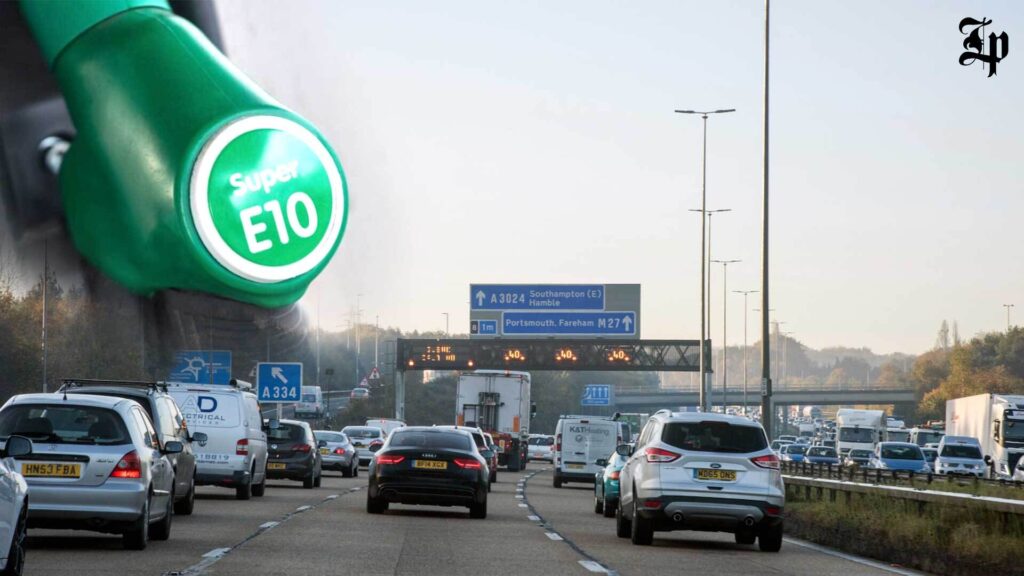E10 petrol will be the regular fuel supplied at nearly all UK forecourts beginning in September, placing more than 500,000 vehicles at risk of harm. The new unleaded is being rolled out across the country as part of the government’s attempts to reduce CO2 emissions. The cleaner fuel is expected to cut CO2 emissions by 750,000 tonnes per year. In the United Kingdom, current fuel types include up to 5% bioethanol, known as E5. The planned E10 fuel raises the percentage of renewable energy produced from crops to 10%.

What is E10 petrol, and why is it being introduced?
E10 gasoline is unleaded gasoline that contains up to 10% bioethanol derived from renewable sources such as sugar beets. The current normal unleaded – labeled as E5 – includes up to 5% ethanol.
According to the government, the adoption of E10 gasoline will help cut CO2 emissions from transportation. Fuels with a more significant bioethanol percentage emit less CO2 when burned, and the DfT claims that switching to E10 as standard will cut CO2 emissions by around 2%. It is estimated that switching to E10 will reduce CO2 emissions in the UK by 750,000 tons per year, comparable to removing 350,000 cars from the road.
Will E10 petrol cost more?
In principle, the introduction of E10 should not raise the price of ordinary unleaded at the pump because it is produced at a lower cost. However, the DfT claims that switching from E5 to E10 petrol will increase a car’s average fuel usage by about 1.6%, resulting in drivers paying extra to operate their vehicle.
What is ethanol?
Ethanol is an alcohol-based fuel derived from the fermentation of various plants, including sugarcane and cereals, and byproducts. Unlike regular unleaded gasoline, ethanol fuel is considered to be partially carbon-neutral in the atmosphere. As the plants used to create biofuel grow, they are claimed to absorb more carbon dioxide than is discharged into the atmosphere during fuel generation and combustion. This partially balances the greenhouse gas emissions caused by its manufacture and usage, although the exact amount is still being debated.
Can E10 be used in all cars?
In a nutshell, no. In 2020, up to 600,000 automobiles on our roads will be incompatible with E10. Drivers should contact automobile manufacturers if they have any queries about their individual vehicles. Vauxhall, for example, states that “E10 gasoline may be used in all petrol-engine Vauxhall cars except models with the 2.2-liter direct-injection petrol engine used in the Vectra, Signum, and Zafira.”
Drivers of vehicles registered before 2002 are generally advised not to use E10 since issues have been documented. Furthermore, beginning of 2011, all new automobiles sold in the United Kingdom must be E10 compliant. If you put E10 fuel in an incompatible automobile, it will still operate, but the corrosive characteristics of bioethanol may cause seals, plastics, and metals to be destroyed over time.
There have also been complaints that E10 is less stable gasoline, making it more challenging to start a car that has not been driven in a long time.
What to do if you put E10 in an incompatible car
Using E10 fuel in an incompatible vehicle is determined by the vehicle/engine variant and the amount of fuel used. Although E10 gasoline may not cause immediate damage to your car, continuous usage in an unsuitable vehicle may cause long-term issues.
Because ethanol is a solvent, raising its concentration in gasoline can cause rubber and plastic components such as hoses, seals, fuel lines, and filters to degrade. It also collects water from the environment, which can cause condensation and corrosion in metal fuel tanks, bars, and other components.
The benefits of E10
Secretary of State for Transport of UK Grant Shapps stated, “The next 15 years will be extremely critical for reducing emissions from our roads, as we all begin to enjoy the advantages of the transition to a zero-emission future; before electric vehicles become the norm, we want to benefit from lower CO2 emissions now. This simple move to gasoline containing 10% bioethanol will assist drivers across the country decrease the environmental effect of every journey.”
Like Belgium, Finland, France, and Germany, other nations have already adopted the E10 blend.
“Displacing 10% of Europe’s petrol with ethanol using E10 gasoline, which is widely accessible in France, Finland, and Germany, would cut greenhouse gas emissions from petrol vehicles by more than 6%,” said Robin Wright secretary-general of environmental advocacy organizations ePURE.
Finland is paving the way for the rest of Europe. Since its introduction at the beginning of 2011, E10 fuel has grown its percentage of petrol sold year after year, with the Finnish Petroleum and Biofuels Association claiming a 63 percent share in 2015.
Learn More About Latest News

